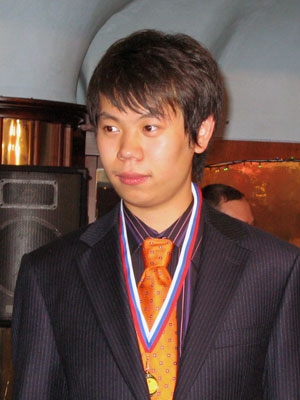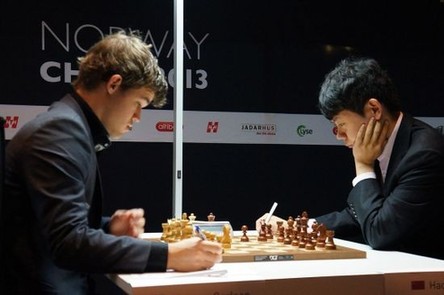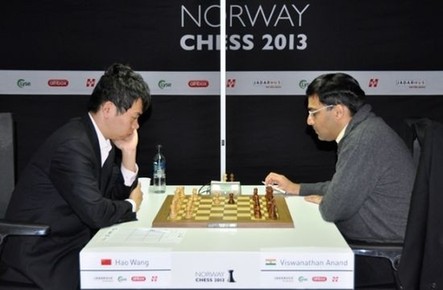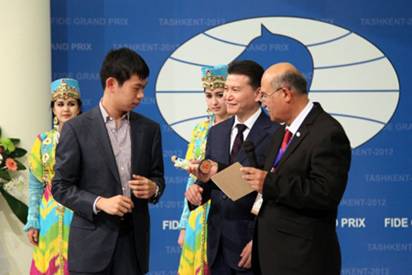Peking University, May 24, 2013: Wang Hao, a junior from Peking University (PKU), became the tormentor-in-chief of the world’s best two across chess board.

Wang Hao (File photo)
Wang, within one day of May 18, made a double kill in the last two rounds of Norway Chess Super Tournament 2013. He first survived a breathless 79-turn game against the world’s current No. 1 (in the latest FIDE World Rankings of May 2013) Magnus Carlsen, whose peak rating of 2872 is the highest in chess history.

Carlsen (L) vs. Wang Hao, diamond cut diamond
Twenty hours later, Viswanathan Anand made 38 moves in front of Wang Hao, only to admit a quicker defeat. It was Wang’s second victory this year over the five-time World Champion from India, who has reigned “undisputedly” since 2007.

Anand (R) finally meets his match.
Wang’s performance, witnessed onsite by his contestants and online by thousands of chess fans, was regarded as the “biggest shock” along the Tournament. According to ChessVibes in Poland, the previous triumph as such might date back to 1986’s World Championship, when Anatoly Karpov won three straight games against Garry Kasparov, the same person as the Championship Defender and the FIDE No. 1.
The Super Tournament, planned as a yearly event in Norway, took place in Stavanger this year as the first edition. In the main tournament, competitors were put in a single round-robin schedule from May 8 to 18, the play order of which had been decided by a blitz tournament in advance. (All the 45 games and 45 blitz games can be downloaded and reviewed in the form of PGN — Portable Game Notation.)
The organizers confirmed the final list of ten invited players in April, including seven of the then top ten. On May 18, the Russian Sergey Karjakin lifted the trophy in Stavanger Concert Hall, while Magnus Carlsen ended on shared second place with Hikaru Nakamura from the US.
Group photo of the competitors (ChessVibes)
Wang Hao, the only Chinese participant, finished in seventh place with three wins, three draws, and three losses. Before the bounce in the last two games, he had been tied for last after five rounds when he lost against the eventual tail-ender Jon Ludvig Hammer.
Cross table of game results and final standings of the Tournament (Norway Chess 2013)
"In the first days of the Tournament, I feel completely exhausted with the continuous jet lag. Later, I slept better and played better," said Wang Hao.
The low-key No. 1 player in China posted nothing but several scenery photos of Norway via Sina Weibo (China's Twitter-like microblogging service), as if he was just an ordinary tourist there. His Weibo account, even not “verified” by name, is followed only by his friends at PKU and elsewhere. When these followers cheered him in comments, Wang simply replied “thanks.”
Conversely, every cell of the other Chinese chess people seemed fully encouraged — if not crazy. For days and nights, they forwarded the Tournament news and videos, spamming their Weibo accounts and chess forums.
Flowers and applause poured towards the 24-year-old man. PKU International Chess Association, where Wang has acted a leading role these years, sent a transcontinental message of congratulation right after the Tournament.
There came higher expectations as well. “Wang Hao must be the most powerful Asian player after Anand,” asserted Li Xiaopeng, leader of PKU Student Chess Team, “he is not only the first Chinese to beat top players — he has beaten them three times this year!”
Li, who has watched Wang grow up to be the core of China’s National Chess Team, is deeply impressed by both the mature skill and the big heart. He even set a goal for Wang as World Champion, the highest title a chess player can attain — “There is chance for him to realize the half-century dream of China’s chess players, as long as he further gathers his top-level competition experience and stabilizes his performance.”
With an increasing number of strong Chinese players, the world’s No. 16 has taken a step ahead of them with several strong performances to become the highest rated of them all.
Wang, at the young age of 16, became China's 20th Grandmaster (GM) with three norms achieved in 2005. Previously, he came third in the U-10 Youth World Championship in 1999, and then won gold for the Chinese national team in the U-16 Chess Olympiad in 2002.
In 2010, Wang won the Sarajevo Open — ahead of 168 players — and the Chinese Championships, which opened many doors and brought him invitations to the major international tournaments.
It was two titles in 2012 that fuelled the entry of Wang into the world-class ranks: In August, he won the Biel Chess Festival in Bienne, Switzerland, one point ahead of Magnus Carlsen. On December 5, he shared championship with Russian players Sergey Karjakin and Morozevich in the 2012-2013 FIDE Grand Prix Series.

Wang (L) receives the trophy of FIDE Grand Prix Series in Tashkent, Uzbekistan.
Wang Hao, as new National Champion, was admitted to PKU School of Journalism and Communication in 2010. With a set of credits to earn in each semester, he has to make the best of the spare time for chess training in the dormitory — and he seems on song in both the battles.
On Wang’s way towards a top player, more and more eyes have been focused, making him the talk around Yanyuan Campus. On the historic triumph in Biel last year, a congratulatory message was sent to encourage him for more national glories, jointly signed by PKU Council Chairman Zhu Shanlu and former President Zhou Qifeng.
Written by: Liu Qi, and Arthars
Source: PKU News (Chinese)